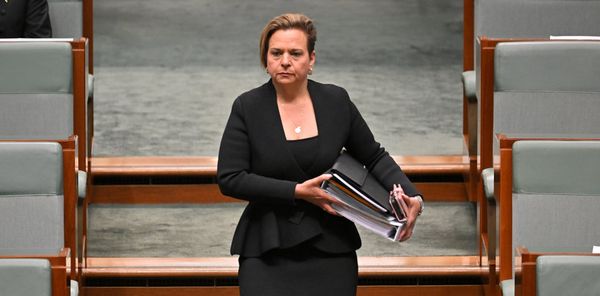Taken from their families due to the risk of harm, Australia's most fragile children are raised by the state instead.
Under a minister's guardianship, they're often exposed to more trauma and abuse — but stringent child protection laws prohibit us from talking to them about it.
Many suffer in silence until they "age out" of the system.
In most cases, the child safety departments' responsibility ceases on the day they turn 18. They won't know what becomes of the children they took in, and how good of a parent they were, really.
But this time, those former children of the state have told us.
This story includes accounts of child abuse.
Locked up
"A million dollars for the organisation that will…'contain' her."
Raised by a mother who had a history of severe mental illness, mealtimes for Lily* and her siblings were a "feed with the dogs".
"She'd tell us to go eat with the dogs outside, and she'd cook food and eat it in front of us," she said.
"I didn't know how to eat with a fork and knife, and when I went to care I ate with my fingers."
Trivial everyday activities can make Lily — who has an intellectual disability — "scared and upset".
When she showers, she can still feel her mother's tight grip around the hair on her scalp as she shoved soap down her throat.
Victoria's Department of Families, Fairness and Housing (DFFH) intervened when Lily was about five years old, although they had looked into the family before then, she said. The department said it could not comment on individual cases.
When Lily recalls her time in care, her memories are overshadowed by two particular foster fathers whose eyes she can still feel on her when she showers.
Realising she wasn't safe even in care, her behaviour grew increasingly erratic.
She was sent into a residential group home — known as "resi" — in Bendigo, where she fast developed a reputation for assaulting staff, damaging property, lighting fires and resisting police.
Those incidents would land her in secure welfare — a closed or locked facility for children aged between 10 and 17, who are deemed to be a risk to themselves or others.
According to the Victorian government, it is "the most extreme form of protective intervention and all other options must be explored first and relevant human rights considered".
It states that "in exceptional circumstances", a child can be kept in secure welfare for a maximum of six consecutive weeks. Both Lily and Kylie Love — her support worker later in life — say on one occasion she was confined for six weeks, released for the afternoon, and taken back in for another six-week stint.
"If you look back, it was just crying out for help," Lily said.
"I wanted to feel safe and secure.
"I didn't feel like being in resi, it didn't feel like home. And then, I was institutionalised."
From the age of 12, Lily spent time at the Parkville Youth Justice Precinct in Melbourne, where she mixed with volatile kids far older than her. By 17, she had become one of the highest-profile cases in the state.
Residential youth worker Kylie Love — who at the time worked for the Salvation Army — said her manager told her the department was struggling to place Lily.
"There was a million dollars for the organisation that will take her on — and I think the [department's] words were 'contain her' — until her 18th birthday," she said.
Ms Love attended a two-hour meeting, where the department appealed to organisations to take Lily for the remainder of her time in care.
"At the end of the meeting, I put my hand up and asked what her triggers were, and her case manager actually said she doesn't have any triggers," she said.
"I was a bit shocked that this case manager had worked with her for a number of years but wasn't actually able to identify any of her triggers. It made me quite aware that the level of care she had received wasn't great."
The team at the Salvation Army had to strike a delicate balance between encouraging Lily's independence and giving her the childhood she never had.
They even successfully appealed to the government to continue caring for Lily until she turned 19.
"The last shift that we did with her, we were actually quite emotional," Ms Love said.
"She gave us a hug…she was like, 'it's OK, this isn't a goodbye, this is just a see you later'.
"It was like she's actually allowing us to exit, which would have triggered her many a times before."
Now 27, Lily leans on disability support worker Sarah*.
Spending most days together, Sarah has witnessed Lily soften.
"She's just come so far. I could just cry at what she went through," she said.
But she's also seen Lily "at her worst".
"I've seen her go off. She'll say, 'I hate you'," she said.
"After half an hour, she'll come, she'll calm down and say, 'I'm so sorry, Sarah'.
"And I say, 'that's OK. Apology accepted. Let's start the day again. Hey Lily, what are we doing today?'"
They might go shopping, blow-dry hair, cook, or take a long drive along the beach for fish and chips.
"A lot of it is for [her] to feel human again," Sarah said.
"I wanted to show her love.
"I wanted to show her compassion.
"I wanted to show her that life is beautiful."
Through therapy, Lily has found it in her heart to forgive her mother, who grew up in similar conditions to what she exposed her children to.
When Lily is not organising Meals on Wheels deliveries for her mother, she's on the streets handing out bags of noodles, tea and sanitary pads to the homeless.
With just eight years of education but a lifetime of trauma behind her, Lily is unable to work, relying on NDIS support.
Picturing her future, she sees herself lending her ears to those in need.
"I want to advocate for the young people that come into care now and be a voice for the ones that can't. The ones that are disabled and can't talk," she said.
After all, she knows the system better than anyone else. It raised her.
Stolen future
"I only finally went to school when I was about 13."
For years, Jamie West had weathered the beatings of a man who dated his mother. And one day, Jamie says the man called child protection to come and take him away.
For a 10-year-old boy, who had just been separated from his mother, foster parents were strangers and foster homes shelters. It sure did not feel like he belonged, with one foster family having him sleep in their garage.
At a youth service months later, his disabilities, including autism, made him particularly vulnerable to the other kids' cruelty — and sexual abuse.
Jamie says he was about 11 years old, when another resident — a 17-year-old boy — first raped him.
While still too innocent to understand "the gravity of the incident", Jamie knew he had to get away.
After the assault, he absconded "to try and return to his mother", even though he didn't know where she lived.
A referral letter to a psychiatric service years later stated the employees of the Department of Communities and Justice (DCJ) in New South Wales knew of the 17-year-old boy's sexual violence history but allowed Jamie to "bath (sic) with him on several occasions".
Jamie says that's when most of the assaults happened.
"I'm still questioning why the hell would a support worker let a child in a bath with nearly an adult," he said.
The DCJ could not comment on his case.
After confiding in a female friend, Jamie was told what was happening to him was child abuse — a revelation that led him to confront the older boy in the communal area.
"He picked me up by the throat and tried to choke me out," he said.
"There was a formal report done, but nothing was ever done about it."
Four months ago, the department compensated Jamie for the abuse that took place in their care nearly two decades ago.
"I have lost count on how many autistic meltdowns I have had since confronting my own past," he said.
"How many times I have lost who I am and hit myself.
"The nightmares, they just don't stop."
Not only has the department robbed him of his past, they've also taken his future, he said.
"I did not get much education at all," he said.
"I only finally went to school when I was about 13, and that was only a few hours per week.
"They didn't look after me, and I didn't have the education that I truly should have had.
"I found, personally, with the kids who end up in group homes, they fall through the cracks."
For Jamie, now 31, it's easier to live in the safety of the virtual world than face the injustices of the real one.
Days can roll into nights, weeks even, with Jamie cocooned in his small rental room in Newcastle, gaming.
That he's withdrawing is a sign he's under "extreme bouts of stress".
Fifteen job applications — yet, not a single response — and a lease that expired a few days ago have pushed him to "new limits".
But Jamie counts himself lucky he has a few close friends who can tell when he's not coping.
With their encouragement, he's slowly re-emerging from the safety of his room and into the light of day, heading to local cafes where he pays for coffees for strangers with the last remaining dollars of his disability support pension.
It's far from the future he imagined for himself as a child, when he dreamed of studying music at the Western Australian Academy of Performing Arts.
"I still do," he said.
"But it's not as easy as it looks because people just look at me and go, 'nope'."
And so it is that his songs remain shelved away.
There, among others, lie agonising lyrics to 'A Ballad of Care':
This is my youth
The pain that you see
I've lived through the worst of it
But it will forever be with me.
On the streets
"She just always felt like she was a temporary person."
By the time Claudia Simpson entered care at the age of three, she says she had already been exposed to sexual abuse.
Two years later, concerns were raised that she had been molested again — this time, while in foster care. The DCJ said it could not comment on her case.
"Someone in my case notes once described me — and this is a really difficult thing to say — she described me as an 'oversexualised three-year-old' in my behaviours," Claudia said.
"No-one had ever sat down and discussed it with me because they were like, 'oh, she doesn't remember, so let's not sort of bring it up'.
"But I always knew that something like that had happened. I was very aware of it."
Claudia had 13 placements while she was in care. At least two of those made her believe she had finally found home.
"I was meant to be with [this family] forever ... they got me a puppy," she said.
"I was thinking about high schools. I had all my friends."
By 15, both of her long-term placements had lapsed. Fed up, she figured she'd be better off at a women's refuge in Sydney's inner-west.
"I came from people who were very low socioeconomic, had their issues. A part of me was like, I'm just sick of pretending I'm going to be fine. So, I decided I wasn't going to try anymore," she said.
She fell into "some pretty bad habits", left the shelter and became homeless — a 15-year-old ward of the state sleeping in car parks and on playgrounds.
One morning, Claudia woke up feeling so ill she thought she might die. She reached for her phone and dialled the number of the one person she knew would pick up — her childhood friend's mother.
Cate Mckenzie and her partner Nick Bron first met Claudia when she was 11.
"She was just so bright. But underneath, we could see that there was a huge amount of pain," Ms Mckenzie said.
"She just always felt like she was a temporary person, and she did verbalise that as well."
The couple had thought about adopting her, but were advised by a social services agency Australia's adoption pathways would be notoriously "difficult" to navigate.
They welcomed her into the family nonetheless, and encouraged her to finish high school and try to get into the University of Sydney.
"I had to apply on special consideration because my ATAR equivalent was not what was required by the university. They needed 80 and I only had 73," Claudia said.
"I had to write an essay as to why I should be granted special consideration.
"As a previous foster child, I just wanted to do really well.
"And going to the University of Sydney ... would have been so special to me."
That she was accepted to do English and sociology, Claudia partly attributes to Cate and Nick.
"The older I get, the more I realise — they were the ones always in my corner," she said.
They loved her like their own, and when Claudia turned 21, adopted her.
The couple were supportive of her search for roots. So much so, they got her a DNA kit for Christmas.
On a quest for the answers, Claudia reached out to her biological mother. It was a "surreal" experience, meeting at a food court.
"She couldn't really explain what she was doing. She's very transient. And she also didn't ask one single question to me the whole time," she said.
"I won't be reaching out to her again."
Now aged 25, she's making a career in a legal services firm while nearing the end of her degree.
But the long shadow cast by her time in care hasn't left her, presenting as "an immense amount of guilt and shame".
Out the other side
Regardless of the incredible adversity they've gone through, these young people all think of themselves as the success stories of Australia's child protection system.
That they've fared better than predicted, is not because of the system but despite it, they say.
They all met someone along the way, who displayed extraordinary kindness and showed up for them when they needed it the most.
Likewise, they've all left somebody behind — a peer in care, like them — who didn't have that.
The DFFH in Victoria and the DCJ in New South Wales said they were focused on providing high-quality care.
"Victorian children and families have access to more support services through a $2.89-billion investment in the children and families system over the past three budgets as part of the Roadmap for Reform," a DFFH spokesperson said.
The Roadmap for Reform focuses on early intervention, information sharing, culturally safe supports, extra training and what the department called the biggest-ever child protection workforce boost.
It said there were guidelines on how staff and carers should look after children, and it aimed to provide individualised care, including helping kids engage with mental health, drug and alcohol services over many years.
It said those leaving care had access to services across health, housing, education, employment, cultural connections and case work support.
The department said the state was the first jurisdiction to extend the Home Stretch program — which provides accommodation allowance and helps make the transition from residential care to independent living — to young people leaving care up to the age of 21.
The DCJ also said a range of supports were available to care leavers — where a young person demonstrated a need for ongoing support, assistance was available up to the age of 25.
It said a care leaving plan, that was developed with the young person, outlined the goals and areas of support.
"Plans cover a range of needs and include connection to family and building the young person's personal support network," a spokesperson said.
"Young people can get supports, referrals and assistance across areas like housing, employment and training and health and wellbeing, including counselling and psychological supports."
Former wards of the state can seek help through a DCJ Client Service Centre or by calling the Care Leavers' line.
Earlier this year, a major ABC investigation revealed what Attorney-General Mark Dreyfus said were "horrific" examples of failures of families and children in the child protection system. To date, around 1,100 people across the country have come forward as part of the investigation.
In June, Mr Dreyfus said he would meet with the National Children's Commissioner to discuss her concerns children were not safe in care and see "what action we can all take to protect children in care". The ABC asked Mr Dreyfus's office what improvements had been made since then.
"The government is working closely with all jurisdictions and the community sector to implement the National Strategy to Prevent and Respond to Child Sexual Abuse 2021-2030 (National Strategy)," a spokesperson said.
Mr Dreyfus's last month attended an advisory group for the national strategy that discussed how governments could improve responses to child sexual abuse and enhance child safety. His office said he was now giving "careful considerations" to the points raised.
It also said last month the governments released a National Plan to End Violence against Women and Children, and that work was underway to finalise Safe and Supported: the National Framework for Protecting Australia's Children.
*Name has been changed.
Credits
- Reporting: Katri Uibu
- Photography: Brendan Esposito and Danielle Bonica
- Graphic design: Paul Strk
- Digital production: Katri Uibu
- Digital editor: Daniel Miller







